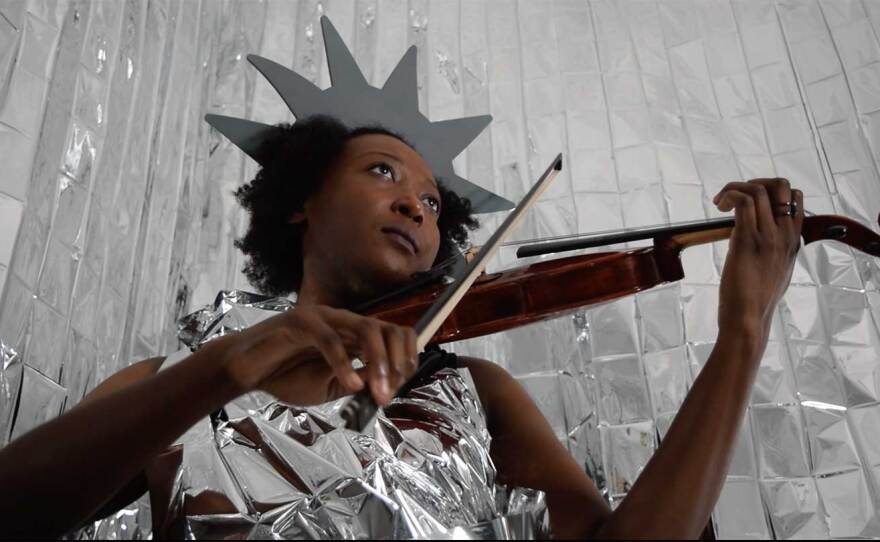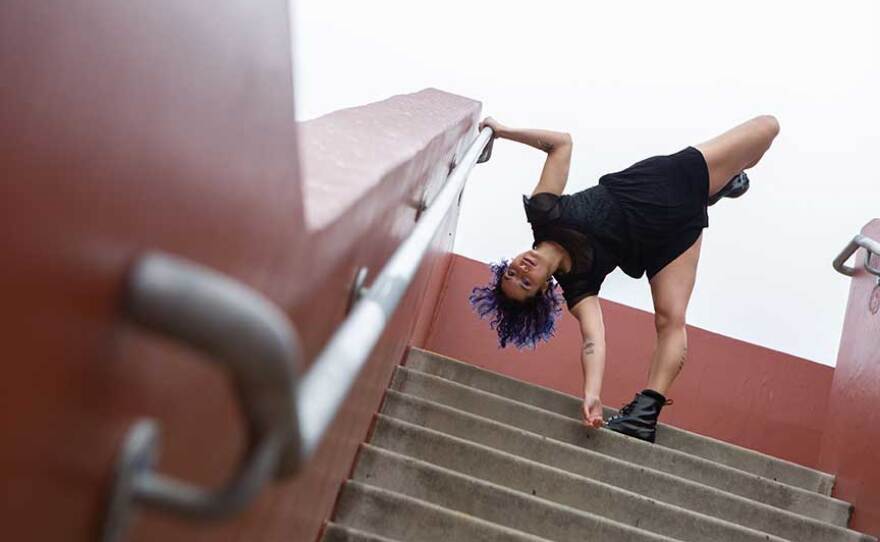"All dance is activism in some way. All dance is political. There's no way to remove the implications of the body that you're watching from," said Zaquia Mahler Salinas, artistic director of the nonprofit dance organization Disco Riot. In dance, there's inequity in whose stories are told, and by whom, and where, said Salinas, and in that way there are parallels to civic decision making and voting.
The dancers, choreographers and multidisciplinary artists of Disco Riot, based mostly in San Diego, spent the summer stitching together a series of short dance films called "Move American," centered around issues of democracy, voting and election rights.
They're releasing a new film each Monday along with resources that bolster the film's theme — plus essential election and voter registration information. They plan to continue this process through election day in November, and San Diego viewers can watch an outdoor screening of the full series this Saturday evening at Art Produce.
One piece, Desiree Cuizon's "Ilaw Suga Light," draws on parallels of oppression and fear under Rodrigo Duterte in the Philippines with the current state of democracy in the United States. Cuizon, who choreographed and performed the piece, dances against recognizable local chain-link fences, evoking a caged bird, to an accompaniment of poetry and, eventually, a rough, percussive drumbeat.
Alongside Cuizon's work, three other short films are also already available for viewing and sharing online: "By Any Means Necessary" by Derion Loman, "Handle with Care" by Alyssa Junious and "I Think Maybe This is How it Feels Like" by Angel Acuña.
Dance — which relies on the manual labor of an artist to "make the art appear" — is more than an entertainment, said Salinas. It's a reflection of power.
"Regardless of who it is that you're watching dance, whether they're doing a classical ballet or a hip hop piece or a post-modern piece, who you are watching on stage is already a political statement, and it's an artistic statement and those things are not mutually exclusive because we're working with human bodies," said Salinas.

Salinas points to the history of dance, like how the Paris Opera Ballet Company was a direct link to King Louis XIV, and reflected the system of society and its values.
"From the audience perspective, when you are a person of color and you grow up only watching white people on stage, that tells you something about who belongs there. When you are a dancer who does something that isn’t a Western dance form. If you are a tap dancer or if you’ve been doing Folklorico your whole life and you go to the theater and the only thing you see on the stage is ballet, it informs your perspective of what things are valued," said Salinas. "What is important culturally, those things are always reflected by what we see on the stage."
Disco Riot was founded in late 2018 in a way to infuse some change into the culture of dance by building opportunities in and out of the region for independent dancers, as well as other artists. The group thrives on cross-disciplinary practice — collaborations with musical artists, video, residencies alongside visual artists, and more. Salinas said another collaborative element is with the audience — finding ways to engage with and deliver an "in-body" experience for an audience, beyond sitting and looking straight ahead at a theater stage.
These concepts of stages and engaging with audiences have taken a major turn in the pandemic. The stories the movement artists share in "Move American" spotlight what it means to have a fundamental right to vote, as well as how the political culture is evolving right now.
The stories aren't necessarily new for some artists, particularly artists of color, but they have a changing relevance as the election nears and the audience is willing to listen.
"It's true that the pandemic adds an additional layer of crisis, but Black people have always been in a state of survival," said dancer and choreographer Zack King. King, along with Nhu Nguyen, are part of a group called Indivisible Nature Collective and have contributed a future installment to "Move American."
"Dance has always been a part of the revolution," said King. "Slaves used dance as a way of deepening their community ties, connecting to their roots and rebelling against the plantation masters."
The group has created a dance film for the project about the history and impact of voting rights. For Nguyen, emotion plays into this in a big way. "Even after we check all the facts and listen to all the debates and read all the analyses, we vote with our guts," Nguyen said. The project also represents an artist's — and the art's — need to adapt.
"We as artists of color are so familiar with crises, unfortunately. So our art making has always been a response to crisis. It’s how we digest it and sometimes, how we imagine the alternative futures," Nguyen said. "What has saved me and my process during this tumultuous time — of global pandemic and racial trauma — I feel, was our ability to abandon what we thought we knew about art making and start anew."

On Saturday Oct. 3, Art Produce gallery in North Park will screen each of the nine short films in their garden, alongside a presentation of another dance-centered video project, "MULTICHANNEL_CHATROOM: A Transmedia Duet." The piece, created by Chelsea Zeffiro, Ian Isles and filmmaker Summer Dunsmore, is an interactive, holographic performance. Small audiences can reserve half-hour screening time slots to allow for social distancing in the outdoor space, beginning at 6:30 p.m.
Beyond literally nudging people to vote in this upcoming election, Salinas said that she also wants this project to make a less quantifiable impact: "Whether it’s through making a piece of art or casting a vote, that your voice matters, and it should matter."






